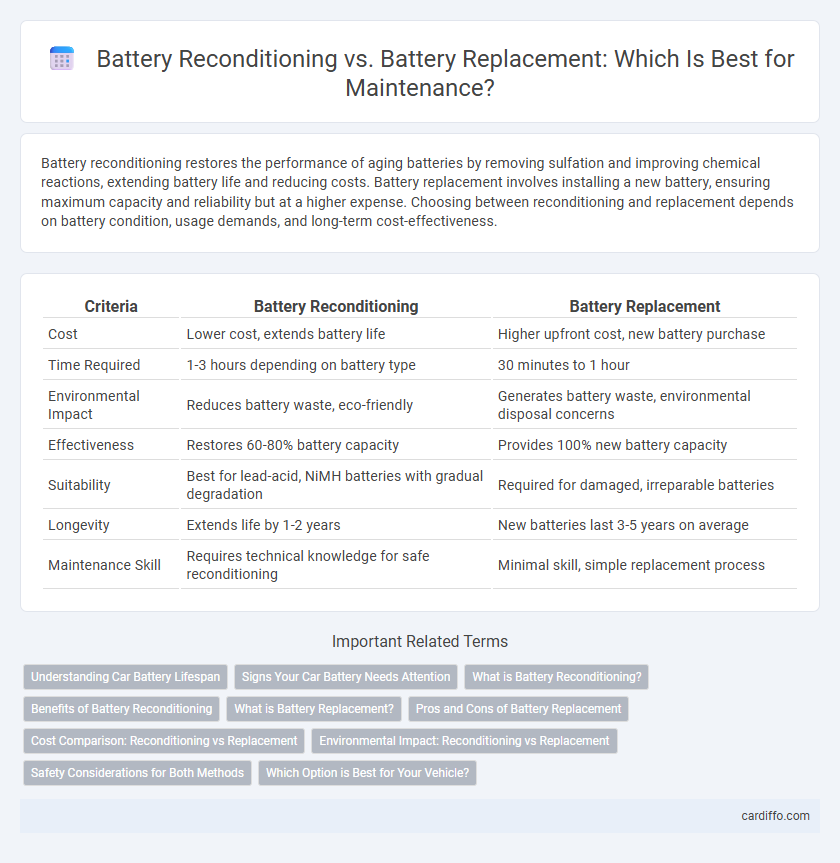Battery reconditioning restores the performance of aging batteries by removing sulfation and improving chemical reactions, extending battery life and reducing costs. Battery replacement involves installing a new battery, ensuring maximum capacity and reliability but at a higher expense. Choosing between reconditioning and replacement depends on battery condition, usage demands, and long-term cost-effectiveness.
Table of Comparison
| Criteria | Battery Reconditioning | Battery Replacement |
|---|---|---|
| Cost | Lower cost, extends battery life | Higher upfront cost, new battery purchase |
| Time Required | 1-3 hours depending on battery type | 30 minutes to 1 hour |
| Environmental Impact | Reduces battery waste, eco-friendly | Generates battery waste, environmental disposal concerns |
| Effectiveness | Restores 60-80% battery capacity | Provides 100% new battery capacity |
| Suitability | Best for lead-acid, NiMH batteries with gradual degradation | Required for damaged, irreparable batteries |
| Longevity | Extends life by 1-2 years | New batteries last 3-5 years on average |
| Maintenance Skill | Requires technical knowledge for safe reconditioning | Minimal skill, simple replacement process |
Understanding Car Battery Lifespan
Car battery lifespan typically ranges from three to five years, influenced by factors such as climate, driving habits, and battery type. Battery reconditioning can extend the life by restoring lost capacity through processes like desulfation, though it may not fully recover performance in severely degraded batteries. Battery replacement ensures optimal reliability and capacity, especially when reconditioning is no longer effective or cost-efficient for the vehicle's electrical demands.
Signs Your Car Battery Needs Attention
Corroded terminals, slow engine crank, and dim headlights are key signs your car battery needs attention, indicating potential failure or diminished capacity. Battery reconditioning can restore performance by removing sulfation and balancing cells, extending battery life without immediate replacement. However, if reconditioning fails or the battery is damaged beyond repair, replacement ensures reliable vehicle operation and prevents unexpected breakdowns.
What is Battery Reconditioning?
Battery reconditioning is a maintenance process that restores the capacity and performance of a rechargeable battery by removing sulfate buildup and balancing its cells. This technique extends battery life, reduces waste, and can delay the need for battery replacement in devices such as cars, laptops, and power tools. Battery reconditioning is often a cost-effective alternative to buying a new battery, especially for lead-acid and lithium-ion batteries.
Benefits of Battery Reconditioning
Battery reconditioning restores the capacity and efficiency of rechargeable batteries, extending their lifespan and reducing electronic waste. It offers significant cost savings compared to battery replacement by revitalizing existing batteries rather than purchasing new ones. This process also supports environmental sustainability by minimizing the demand for raw materials and decreasing hazardous battery disposal.
What is Battery Replacement?
Battery replacement involves removing an old or damaged battery from a device or vehicle and installing a new one to restore optimal performance. This process is essential when reconditioning is no longer viable due to severe battery degradation, failure, or safety concerns. Replacing batteries ensures reliable energy storage and power delivery, preventing unexpected failures and extending the system's overall lifespan.
Pros and Cons of Battery Replacement
Battery replacement ensures optimal performance and reliability by installing a new, fully charged unit, minimizing unexpected failures and downtime. However, it involves higher initial costs and environmental concerns due to battery disposal challenges. Choosing replacement over reconditioning suits situations demanding long-term dependability and warranty coverage.
Cost Comparison: Reconditioning vs Replacement
Battery reconditioning typically costs 30-50% less than full battery replacement, making it a cost-effective solution for extending battery life. While reconditioning involves restoring existing battery cells at an average cost of $50-$100, replacement batteries can range from $100 to $300 or more depending on the type and capacity. Choosing reconditioning reduces immediate expenses and environmental impact but may require eventual replacement when battery health declines significantly.
Environmental Impact: Reconditioning vs Replacement
Battery reconditioning significantly reduces environmental impact by extending the life of existing batteries and minimizing hazardous waste compared to battery replacement, which often leads to increased landfill accumulation and resource depletion. Reconditioning lowers demand for raw materials such as lithium, cobalt, and nickel, thereby decreasing the carbon footprint associated with new battery production. Prioritizing reconditioning supports sustainable maintenance practices and helps conserve natural resources critical to battery manufacturing.
Safety Considerations for Both Methods
Battery reconditioning and battery replacement both require strict adherence to safety protocols to prevent chemical exposure, electrical shock, and fire hazards. Proper use of personal protective equipment (PPE) such as gloves and eye protection is essential during handling and disposal, while ensuring ventilation in the workspace minimizes toxic fume inhalation. Certified recycling and disposal procedures for old batteries further reduce environmental risks associated with both methods.
Which Option is Best for Your Vehicle?
Battery reconditioning restores the capacity of old or sulfated batteries by removing buildup and revitalizing battery cells, extending battery life at a lower cost compared to replacement. Battery replacement ensures optimal performance and reliability by installing a new battery with full capacity, crucial for vehicles with severely degraded or damaged batteries. Choosing between reconditioning and replacement depends on the battery's condition, cost-effectiveness, and the vehicle's power demands, with replacement favored for critical or high-performance applications.
Battery reconditioning vs battery replacement Infographic

 cardiffo.com
cardiffo.com